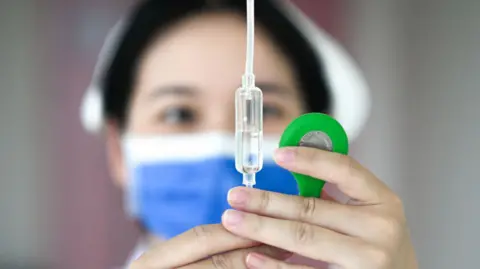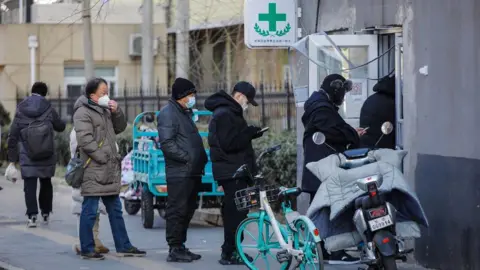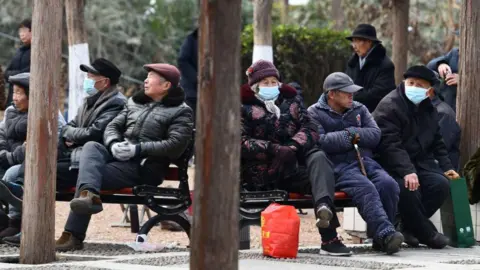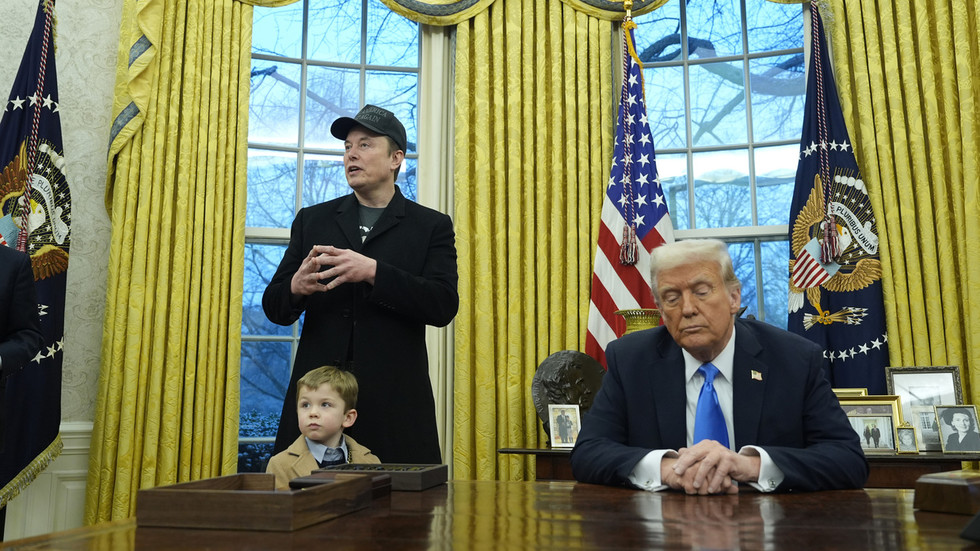
 Getty Images
Getty Images
Public anger in China over concerns raised by doctors that generic drugs used in public hospitals are increasingly ineffective has led to a rare response from the government.
Doctors say they believe the country's drug procurement system, which incentivises the use of cheap generic drugs over original brand-name pharmaceuticals, has led to costs being cut at the expense of people's safety.
But officials, quoted by multiple state media outlets on Sunday, say the issue is one of perception rather than reality.
One report said different people simply had different reactions to medicines and that claims about them being ineffective had "mostly come from people's anecdotes and subjective feelings".
The official response has done little to allay public fears over the reputation of drugs in public hospitals and pharmacies. It is the latest challenge to a healthcare system that is already under enormous strain because of a rapidly ageing population.
How did it all begin?
The debate surrounding the use of generic drugs began in December, when authorities announced the list of nearly 200 companies that had won contracts to sell medicines to Chinese state hospitals. Almost all were domestic makers of generic pharmaceuticals.
This intensified in January, when, in a video interview that went viral, the director of a hospital department in Shanghai, shared his concerns about the drug procurement system.
Zheng Minhua cited "antibiotics that cause allergies, blood pressure that won't go down, anaesthetised patients who won't sleep" and laxatives that did not clear the bowel as being among the issues that had been encountered.
Dr Zheng's words immediately struck a chord and have been condensed into a social media slogan that has been viewed by millions in the past month - though much of the discussion of the topic has since been censored on Weibo. Many people have come forward to share their own bad experiences with alleged substandard drugs.
"I underwent intestinal surgeries in 2024, which required me to consume laxatives beforehand," one Weibo user wrote. They said the drugs they were given had "no effect whatsoever", even after the dose was doubled, and that they had to turn to drinking coffee to help clear their bowel.

 EPA-EFE/REX/Shutterstock
EPA-EFE/REX/Shutterstock
The majority of drugs in public hospitals and pharmacies are stocked through the procurement process
The concerns raised over the efficacy of generic drugs has caused distrust and made some people unwilling to use them.
A person on Xiaohongshu, China's Instagram-like app, said that when hospital doctors prescribed them the generic version of an antibiotic, they immediately went online to buy the "original" "real" one, since the generic version "tasted different".
"There have been many people catching colds recently. A lot of them might have bought this drug. Quickly send reminders to your friends now and get them to check the brand before buying," the user warned.
Some of the most popular posts discussing the procurement controversy have been taken down, though it is unclear by whom. China's heavily monitored internet has a strong culture of censorship by both authorities and users themselves.
In a scathing, now-removed post by popular podcast host Meng Chang, he lambasted the lack of imported drugs in the public sector: "If this isn't a bottom line, I don't know what is."
Public anger has also been focussed on the difficulties of accessing imported drugs that people believe to be of better quality.
In response to authorities' attempt to reassure people of the quality of generic drugs, one Weibo user wrote: "As long as we are allowed to buy brand-name drugs ourselves, I have no other complaints."
How does the drug procurement system work?
It was introduced in 2018 as a way to lower state expenditure on medicines and involves local governments putting out tender processes for around 70% of state hospitals' annual drug requirements.
Various drug manufacturers then compete to offer the lowest prices for drugs to win these lucrative contracts.
This gives an advantage to domestically-produced generic drugs, which contain the same active pharmaceutical ingredients as original patented drugs but are often several times cheaper to make as they do not include the high costs of research and development.
China has emerged as one of the world's largest players in the global generic pharmaceutical market, exporting both finished products to consumers abroad and key ingredients to foreign companies. At home, thousands of generic drug manufacturers compete to sell their products at competitive prices in the expanding domestic market.
For generic medicines to be eligible for China's procurement process, they have to be tested and determined to be similar enough to the brand-name version of the drug.
Beijing has credited the drugs procurement system with saving millions of residents more than $50bn (£40bn) in its first five years.
But the procurement process has seen some drug manufacturers offer medicines at incredibly low prices. One of the winning bids last December was an aspirin tablet selling for less than one cent.
"Are drug tablets that cost less than one cent edible?" became a trending topic on Weibo at the time.
"The manufacturers that win the bids often set prices so low that they may struggle to produce high quality drugs with the correct ingredients, potentially leading to ineffective medications," Stacy Zhang, associate professor at NYU Langone Health, told the BBC.
She added that while the procurement system "was not designed to restrict access to imported brand-name drugs", it may still have "affected their accessibility".
Questions over data and efficacy
A proposal submitted by 20 doctors, including Dr Zheng, to Shanghai authorities last month stated that "there are widespread concerns in the industry that procurement prices are too low, prompting unethical companies to cut corners to reduce costs, affecting the efficacy of drugs".
"Doctors are helpless because they have no choice, and there is no channel to escalate feedback."
A recent article by Xia Zhimin, a doctor in Hangzhou, has added to the scrutiny. In it, he highlighted what he said was questionable data from the trials of generic drugs on the procurement list - it was identical to the data from the original drug on which it was based. Dr Xia suggested that it could be evidence of fraud.
The National Medical Products Administration responded by saying his findings were due to an "editorial error". His article has since been removed.
Adding to quality concerns are counterfeit drugs, which have seeped into both generic and brand-name drugs markets across the world and are notoriously difficult to detect. The World Health Organization has described this a global health problem.
"To enhance affordability, the introduction of cost-effective generics is essential," Kevin Lu, associate professor at the University of South Carolina's College of Pharmacy, told the BBC.
He added that the procurement process needed "strengthened quality control" and "continued improvements in drug approval and manufacturing standards".

 Getty Images
Getty Images
China's rapidly ageing population put increasing pressure on its healthcare system
A sector in crisis
The controversy comes at a time when China's healthcare system is already under mounting pressure.
A rapidly ageing population has meant that the country's total health expenditure has increased nearly 20-fold over the last 20 years, reaching 9 trillion yuan ($1.25 trillion; £1 trillion) in 2023.
Across the country, public medical insurance funds are running thin. Deficits have already appeared in some provinces, where local governments that had relied heavily on land sales for revenue are now struggling with debt as a real estate crisis engulfs China's economy.
At the same time, the healthcare system has been experiencing a trust crisis. Violent attacks against medical staff have risen since the 2000s, fuelled by anger at the lack of resources and an erosion of faith in doctors.
Unlike issues that have been deemed politically sensitive and heavily censored by authorities, such as the persecution of political dissidents or the suppression of the Uyghurs in Xinjiang, the ongoing controversy surrounding the procurement of drugs has at least been acknowledged by the state as a problem to be tackled.
The National Healthcare Security Administration said in a statement on 19 January that authorities "attached great importance" to these safety concerns and would seek feedback on the drug procurement policy.
"It is undeniable that the national centralised procurement is still in its infancy. There are many pharmaceutical companies with varying production quality," state media Life Times quoted a public health scholar as saying. Other experts cited in the article called for drug evaluation standards to be improved.
As authorities try to remedy the procurement system's faltering image, all the scrutiny is now overshadowing a system designed to be a win-win: saving lives and also saving money.
As one Weibo user argued, the savings from lower drug prices are but "a drop in a bucket" of China's national healthcare costs. On the other hand, they wrote, allowing potentially defective drugs to be widely used is akin to "drinking poison to quench thirst".

 4 hours ago
3
4 hours ago
3









